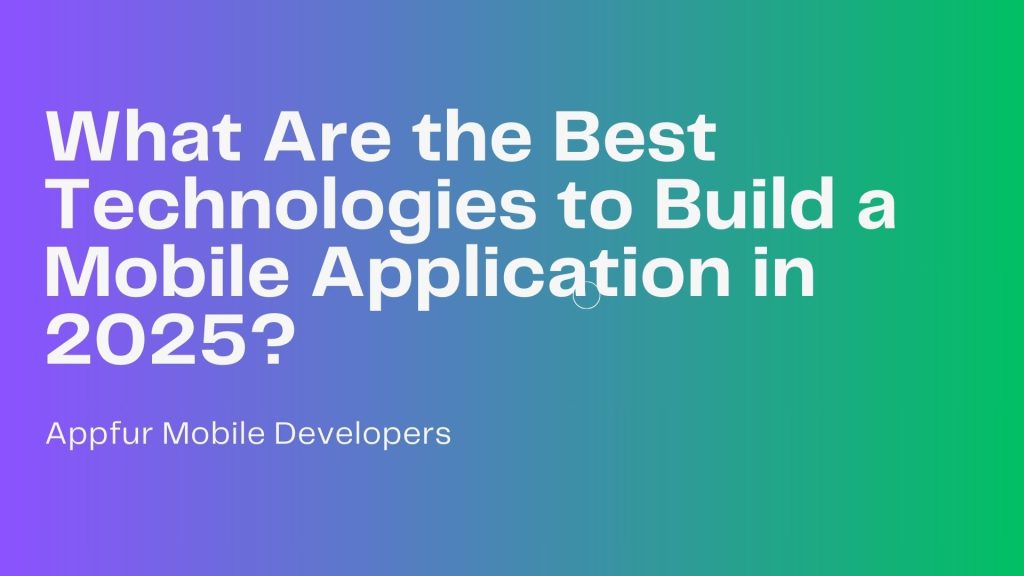Mobile applications have become essential tools for businesses, startups, and entrepreneurs aiming to engage users and scale their services. However, building a mobile app goes beyond just the idea — choosing the right technologies is one of the most critical decisions that will influence performance, scalability, maintenance, and user experience.
So, what are the best technologies you should consider when developing a mobile app in 2025? Here’s a breakdown of the most recommended tools, frameworks, and platforms to guide your decision.

1. Flutter (by Google)
Best for: Cross-platform app development (iOS & Android)
Flutter remains one of the top choices for mobile development. It uses Dart language and allows developers to write one codebase for both Android and iOS.
Why choose Flutter?
- Fast development with Hot Reload
- Beautiful, customizable UI components
- Strong community support
- Backed by Google and constantly evolving
2. React Native (by Meta)
Best for: Startups and MVPs with native performance
React Native is another popular cross-platform framework, using JavaScript and React. It enables developers to build mobile apps using web technologies.
Pros:
- Code reusability between web and mobile
- Access to native APIs via plugins
- Vibrant developer ecosystem
3. Swift (for iOS)
Best for: Native iOS applications
Swift is Apple’s official programming language for iOS, macOS, watchOS, and tvOS apps. If you’re targeting a premium iOS user base, Swift is a solid choice.
Strengths:
- High performance and safety
- Better user experience on Apple devices
- Supported directly by Apple
4. Kotlin (for Android)
Best for: Native Android apps
Kotlin is now the preferred language for Android development, officially supported by Google.
Key benefits:
- Concise and expressive syntax
- Interoperable with Java
- Full access to Android APIs
5. Xamarin (by Microsoft)
Best for: Enterprise apps with .NET ecosystem
Xamarin allows developers to build apps using C# and .NET while sharing a significant amount of code between platforms.
Why Xamarin?
- Full access to native APIs
- Backed by Microsoft
- Great for enterprise-level applications
6. Backend Technologies to Power Your App
The mobile app frontend is just one part of the story. The backend ensures data processing, user authentication, notifications, and more. Popular backend options include:
- Node.js – Lightweight and efficient, ideal for real-time applications
- Firebase – Backend-as-a-service, ideal for quick MVPs and real-time apps
- Django (Python) – Secure and scalable for complex backend systems
- Laravel (PHP) – Good for rapid API development with a clean structure
7. Databases for Mobile Apps
Choosing the right database depends on your app’s complexity and data structure:
- SQLite – Lightweight and embedded, good for local storage
- Firebase Realtime Database / Firestore – Great for live syncing and small apps
- PostgreSQL – Excellent for relational data and complex queries
- MongoDB – Ideal for flexible, NoSQL data needs
8. Cloud Platforms & DevOps Tools
Modern mobile apps require reliable deployment and hosting tools:
- AWS / Google Cloud / Azure – Cloud platforms for scalable backend hosting
- Docker & Kubernetes – Containerization for microservices and deployment
- CI/CD Tools – GitHub Actions, Bitrise, or Jenkins for automated builds and testing
Final Thoughts
The right tech stack depends on your app’s goals, target audience, budget, and timeline. Whether you’re building a simple MVP or a full-scale product, using modern, scalable, and supported technologies will set you up for success.
At Appfur, we help startups and enterprises choose the best technologies tailored to their goals. Whether it’s Flutter, React Native, or a fully native solution, our experts ensure your mobile app is built to perform and scale.
Ready to build your app the right way?
Let’s talk — Contact Appfur!
If you found this post valuable and you're serious about turning your app idea into a real product, let’s take the next step together. At Appfur, we specialize in transforming early-stage concepts into fully functional, user-focused applications.
We’re offering a free 30-minute strategy session to help you:
- Validate your app idea with an expert
- Identify the fastest, most cost-effective path to launch
- Get a clear, actionable plan tailored to your goals
No hard pitches. No fluff. Just real value.
Click the link below to schedule your free call — spots are limited each week.
